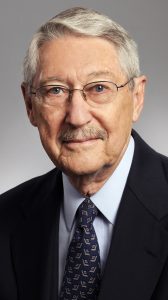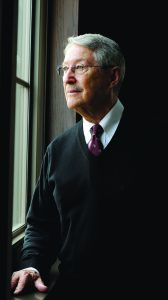
Dr. Max Cooper, a UM alumnus, is co-recipient of the 2019 Lasker Award for his pioneering discovery of B lymphocytes, which led to breakthroughs in the field of immunology. Photo by Jack Kearse/Emory University School of Medicine
OXFORD, Miss. – About 50 years ago, University of Mississippi alumnus Dr. Max D. Cooper, a pediatrician, discovered B cell lymphocytes, one of the most important components of the human immune system.
This discovery, together with Dr. Jacques F.A.P. Miller’s concurrent discovery of thymus-dependent T cell lymphocytes, revolutionized the field of immunology, particularly in the development of novel vaccines, treatment of immune deficiency diseases and treatment of autoimmune diseases.
The pioneering discoveries have been recognized most recently with the 2019 Albert Lasker Basic Medical Research Award, known as “America’s Nobel Prize.”
“The Lasker Award is considered the most prestigious award for medical science in the United States, which makes it very special to me,” said Cooper, an Emory School of Medicine professor who earned his medical certificate from UM in 1955. “I wasn’t expecting it and almost missed reading my notification letter. When I read it, I was doubly surprised and honored.”
Presented by the Lasker Foundation, the award recognizes the contributions of leaders who made major advances in the understanding, diagnosis, treatment, cure or prevention of human disease. Widely regarded as America’s top biomedical research prize, the Lasker Awards carry an honorarium of $250,000 for each category. They were presented Sept. 20 in New York City.
Cooper remembers UM as the place where he formed lasting friendships with a community devoted to common purposes and timeless experiences far bigger than themselves.
“Ole Miss was a joyful, formative and transitional time in my life,” Cooper said. “As a pre-med student, I came there to take organic chemistry and other courses mandatory for admission into medical school.
“I remember having wonderful teachers, such as Arthur Guyton, whose knowledge and lucid lectures inspired my gradual transition from being a playful undergrad toward becoming a serious student.”
Cooper said Guyton and other Ole Miss faculty set the bar for academics and prepared him to move forward in his legendary career.
“Little did I imagine while growing up in rural Mississippi that I would eventually pursue a research career in immunology,” said Cooper, a professor of pathology and laboratory medicine and a Georgia Research Alliance Eminent Scholar in developmental immunology. “One of the most remarkable things about a career in biomedical research is that one can start almost anywhere and end up in the most unforeseen places, being constantly amazed by what you are learning along the way.”
In recent years, Cooper, joined by his wife, Rosalie Lazzara Cooper, made a major contribution to Ole Miss that both celebrates his relationship with his alma mater and honors his parents through establishment of the Otis Noah and Lily Carpenter Cooper Education Fund. The scholarship endowment was created “to honor these educators’ lifelong devotion to the learning process, to recognize the vital contributions that all educators make to society and to provide income for scholarship assistance to deserving students at the University of Mississippi.”
Those eligible for the scholarships are sons and daughters of educators. Ten Ole Miss students have already benefited from the program.
“I wish we had been able to give even more, but it’s still pretty satisfying to know that funds from this scholarship are helping deserving children of teachers attend Ole Miss,” Cooper said. “I couldn’t imagine a better way to honor my parents’ memory.”
Prestigious awards are nothing new to the scientist-physician. Cooper and Miller, of Australia, won the 2018 Japan Prize, one of the world’s most prestigious scientific awards in the category of “Medical Science and Medicinal Science.” In 2017, Cooper received the Emory 1% Award, which is reserved for faculty whose National Institutes of Health proposals have been ranked in the top 1 percent by NIH reviewers.
In addition, he was bestowed the Legion of Honor Medal by the president of the French Republic and was elected to the Académie des Sciences, Institut de France and the Royal Society of London. In 2010, the Koch Foundation in Berlin selected Cooper for the Robert Koch Prize, considered one of the steppingstones, along with other awards, to an eventual Nobel Prize.
“Each of my awards has been special and significant it its own right, but they were all from other countries,” Cooper said. “It’s gratifying to receive such an honor from my own country.”
Cooper and Miller were honored for their discovery of the dual nature of adaptive immunity, which has contributed to the advancement of anticancer and anticytokine drugs for the treatment of diseases such as rheumatoid arthritis. Over the past 74 years, 88 Lasker laureates have received the Nobel Prize, including 39 in the last three decades.

Mississippi native Dr. Max Cooper has been awarded the 2019 Albert Lasker Basic Medical Research Award, America’s top biomedical research prize, for his work in the field of immunology. Photo by Jack Kearse/Emory University School of Medicine
Cooper is also is a member of the Emory Vaccine Center, the Emory Center for AIDS Research and the Winship Cancer Institute.
Cooper has advised and trained 30 doctoral students and 115 postdoctoral researchers in his laboratory. Paul Kincade, of the Oklahoma Medical Research Foundation – Cooper’s first graduate student, a fellow Mississippian and world-renowned immunologist – considers himself fortunate to have worked with a brilliant investigator who could inspire, nurture and promote trainees.
“The world is blessed with many outstanding scientists, but few have had equivalent impact on medical research,” Kincade said. “Indeed, Max has ‘moved the field’ year after year.
“Perhaps the best part, he continues to operate a competitive laboratory and set fire to legions of promising young investigators.”
Cooper is a member of the U.S. National Academy of Sciences, the Academy of Medicine and the American Academy of Arts and Sciences. He is a former president of the American Association of Immunologists, the Clinical Immunology Society and the Kunkel Society.
Cooper was born in Hazlehurst and raised in Bentonia. His home and the school where his father worked as superintendent were filled with books, sparking his interest in the rest of the world.
After Cooper lost his older brother in a car accident, his grieving father took him aside to tell him that he must carry on with the plan for both brothers: in his case, to become a physician.
Cooper’s college career began at Holmes Community College, and with its football team, but he quickly surmised that he was not going to see fame or fortune on the gridiron. He transferred to UM, where after his studies he enjoyed such quintessential college activities as attending football games, going to dances in the Student Union and playing cards with friends.
Cooper earned his medical degree and completed his residency in pediatrics at Tulane University before more training at the Hospital for Sick Children in London, completing a fellowship in allergy and immunology at the University of California at San Francisco and making a second stop at Tulane University.
He persuaded the famous Dr. Robert Good, a founder of modern immunology and a pioneer in bone marrow transplantation, to invite him to join his research program at the University of Minnesota Medical School.
After four productive years in Minneapolis, Cooper embraced a 40-year career at the University of Alabama at Birmingham School of Medicine, during which time he was inducted into the Ole Miss Alumni Hall of Fame in 1992. He directed UAB’s Division of Developmental and Clinical Immunology for more than two decades, after leading the Cellular Immunobiology Unit at the UAB Comprehensive Cancer Center for 12 years.
He joined Emory University in 2008.
Cooper’s other honors include the Founder’s Award of the Society for Experimental Biology and Medicine (1966), Sandoz Prize in Immunology (1990), American College of Physicians Science Award (1994), AAI Lifetime Achievement Award (2000), AAI-Dana Foundation Award in Human Immunology Research (2006) and the Avery-Landsteiner Prize (2008).